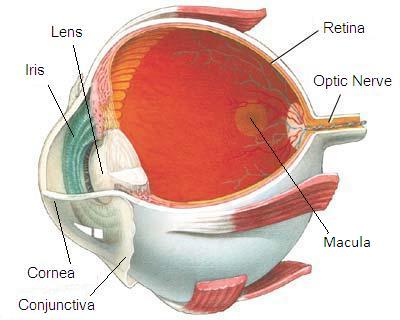Home > about eyes > Macular Degeneration
Macular Degeneration
Age-related Macular Degeneration or AMD (as the name implies) usually affects older adults and results in a loss of vision in the center of the visual field (the macula) because of damage to the retina. It occurs in “dry” and “wet” forms. It is a major cause of blindness and visual impairment in older adults (>50 years). Macular degeneration can make it difficult or impossible to read or recognize faces, although enough peripheral vision remains to allow other activities of daily life.
|
|
In the dry (nonexudative) form, cellular debris called drusen accumulate between the retina and the choroid, and the retina can become detached. There is no known treatment for dry AMD, although it is strongly suggested that vitamin supplements with high doses of anti-oxidants, lutein and zeaxanthin have been shown to decrease the risk, slow the progress, and perhaps even improve visual acuity for a time. In the wet (exudative) form, which is more severe, blood vessels grow up from the choroid behind the retina, and the retina can also become detached. It can be treated with laser coagulation, and with medication that stops and sometimes reverses the growth of blood vessels |
What are the symptoms of macular degeneration?
Macular degeneration is typically painless and includes symptoms of dark or blurry areas in the center of vision, seeing distortions of straight lines, and difficulty doing activities that require sharp vision (e.g., driving and reading). Peripheral (side) vision may remain clear.
 |
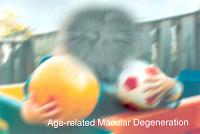 |
Causes
The following factors seem to contribute to the risk of AMD:- Aging: Approximately 10% of patients 66 to 74 years of age will have findings of macular degeneration. The prevalence increases to 30% in patients 75 to 85 years of age.
- Family history
- Macular degeneration gene (it seems genetic)
- Retinitis pigmentosa is a genetically linked dysfunction of the retina (and is related to mutation of the adenosine triphosphate (ATP) synthase gene 615.1617)
- Drusen: Although drusen can be present without loss of vision, they are atypically present in all AMD cases.
- Hypertension: Also known as high blood pressure.
- Cardiovascular status: High cholesterol, obesity.
- High fat intake.
- Race: Macular degeneration is more likely to be found in Caucasians than in people of African descent.
- Exposure to sunlight.
- Smoking.
Amsler Grid Test
The Amsler grid, reproduced here, is an excellent self-test that can show macular degeneration if it is present. The grid consists of straight lines spaced 0.5 cm apart.
|
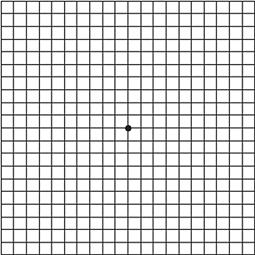
Note: If you normally wear vision corrective glasses or contacts, keep them on for the test.
|
Medical treatments
Underlying medical conditions, such as diabetes and high blood pressure, are treated when present. In some cases, laser eye surgery may be recommended. Although there is some contention, dietary supplements/changes may be helpful.
Dietary changes that may be helpful
In a preliminary study, high intake of saturated fat and cholesterol was associated with an increased risk of developing macular degeneration.2
According to preliminary research, people who eat fish more than once per week have half the risk of developing age-related macular degeneration compared with people who eat fish less than once per month.3
Total alcohol consumption has not been linked to macular degeneration in most studies.4 5 However, one research group has linked beer consumption to macular degeneration,6 7 and in one of two trials, wine drinkers were found to have a significantly lower risk of macular degeneration compared with people not drinking wine.8 9 Most doctors consider these reports too preliminary to suggest either avoiding beer or increasing wine consumption.
Lifestyle changes that may be helpful
Smoking has been linked to macular degeneration. Quitting smoking may reduce the risk of developing macular degeneration.
Nutritional supplements that may be helpful
|
Lutein and zeaxanthin are antioxidants in the carotenoid family. These carotenoids, found in high concentrations in spinach, collard greens, and kale, have an affinity for the part of the retina where macular degeneration occurs. Once there, they protect the retina from damage caused by sunlight.10 Harvard researchers reported that people eating the most lutein and zeaxanthin—an average of 5.8 mg per day—had a 57% decreased risk of macular degeneration, compared with people eating the least.11 While spinach and kale eaters have a lower risk of macular degeneration, blood levels of lutein did not correlate with risk of macular degeneration in one trial.12 13 Lutein and zeaxanthin can be taken as supplements; 6 mg per day of lutein may be a useful amount. |
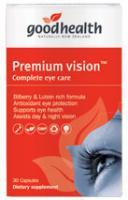 |
Sunlight triggers oxidative damage in the eye, which in turn can cause macular degeneration.14 Animals given antioxidants—which protect against oxidative damage—have a lower risk of this vision problem.15 People with high blood levels of antioxidants also have a lower risk.16 Those with the highest levels (top 20th percentile) of the antioxidants selenium, vitamin C, and vitamin E may have a 70% lower risk of developing macular degeneration, compared with people with the lowest levels of these nutrients (bottom 20th percentile).17 People who eat fruits and vegetables high in beta-carotene, another antioxidant, are also at low risk.18 Some doctors recommend antioxidant supplements to reduce the risk of macular degeneration; reasonable adult levels include 200 mcg of selenium, 1,000 mg of vitamin C, 400 IU of vitamin E, and 25,000 IU of natural beta-carotene per day. However, a preliminary study found no association between age-related macular degeneration and intake of antioxidants, either from the diet, from supplements, or from both combined.19 Moreover, in a double-blind study of male cigarette smokers, supplementing with vitamin E (50 IU per day), synthetic beta-carotene (about 33,000 IU per day), or both did not reduce the incidence of age-related macular degeneration.20
Two important enzymes in the retina that are needed for vision require zinc. In a double-blind trial, supplementation with 45 mg of zinc per day for one to two years significantly reduced the rate of visual loss in people with macular degeneration.21 However, in another double-blind trial, supplementation with the same amount of zinc did not prevent vision loss among people with a particular type of macular degeneration (the exudative form).22
In a blinded six-month study of people with macular degeneration, vision was the same or better in 88% people who took a nutritional supplement, compared with 59% of those who refused to take the supplement (a statistically significant difference). The supplement used in this study contained beta-carotene, vitamin C, vitamin E, zinc, copper, manganese, selenium, and riboflavin.23 People wishing to take all of these nutrients may supplement with a multivitamin-multimineral formula, or a specialised eye formula
Herbs that may be helpful
 |
Ginkgo biloba may help treat early-stage macular degeneration, according to small, preliminary clinical trials.24 Many healthcare professionals recommend 120 to 240 mg of standardized extract (24% ginkgo flavone glycosides and 6% terpene lactones) in capsules or tablets per day. |
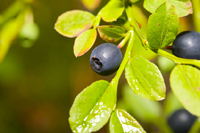 |
Bilberry’s active flavonoid compounds, anthocyanosides, act as antioxidants in the retina of the eye. Therefore, supplementing with bilberry would theoretically be of value for the prevention or treatment of early-stage macular degeneration.25 Bilberry has also been shown to strengthen capillaries and to reduce bleeding in the retina.26 A typical amount of bilberry used in studies was 480–600 mg per day of an extract standardized to contain 25% anthocyanosides, taken in capsules or tablets. |
We are pleased to stock some excellent quality eye health supplements here
References
1. National Advisory Eye Council. Report of the Retinal and Choroidal Diseases Panel: Vision Research CA National Plan: 1983–1987. Bethesda, MD: US Dept of Health and Human Services, 1984. National Institutes of Health publication 83–2471.
2. Mares-Perlman JA, Brady WE, Klein R, et al. Dietary fat and age-related maculopathy. Arch Ophthalmol 1995;113:743–8.
3. Smith W, Mitchell P, Leeder SR. Dietary fat and fish intake and age-related maculopathy. Arch Ophthalmol 2000;118:401–4.
4. Smith W, Mitchell P. Alcohol intake and age-related maculopathy. Am J Ophthalmol 1996;122:743–5.
5. Ajani UA, Christen WG, Manson JE, et al. A prospective study of alcohol consumption and the risk of age-related macular degeneration. Ann Epidemiol 1999;9:172–7.
6. Moss SE, Klein R, Klein BE, et al. Alcohol consumption and the 5-year incidence of age-related maculopathy: the Beaver Dam eye study. Ophthalmology 1998;105:789–94.
7. Ritter LL, Klein R, Klein BE, et al. Alcohol use and age-related maculopathy in the Beaver Dam Eye Study. Am J Ophthalmol 1995;120:190–6.
8. Obisesan TO, Hirsch R, Kosoko O, et al. Moderate wine consumption is associated with decreased odds of developing age-related macular degeneration in NHANES-1. J Am Geriatr Soc 1998;46:1–7.
9. Ritter LL, Klein R, Klein BE, et al. Alcohol use and age-related maculopathy in the Beaver Dam Eye Study. Am J Ophthalmol 1995;120:190–6.
10. Bone RA. Landrum JT. Distribution of macular pigment components, zeaxanthin and lutein, in human retina. Methods Enzymol 1992:213:360–6.
11. Seddon JM, Ajani UA, Sperduto RD, et al. Dietary carotenoids, vitamins A, C, and E, and advanced age-related macular degeneration. JAMA 1994:272:1413–20.
12. Blumenkranz MS, Russell SR, Robey MG, et al. Risk factors in age-related maculopathy complicated by choroidal neovascularization. Ophthalmology 1986:93:552–8.
13. Mares-Perlman JA, Brady WE, Kleain R, et al. Serum antioxidants and age-related macular degeneration in a population-based case-control study. Arch Ophthalmol 1995;113:1518–23.
14. Young RW. Solar radiation and age-related macular degeneration. Surv Ophthalmol 1988:32:252–69.
15. Katz ML, Parker KR, Handelman GJ, et al. Effects of antioxidant nutrient deficiency on the retina and retinal pigment epithelium of albino rats: a light and electron microscopic study. Exp Eye Res 1982;34:339–69.
16. West S, Vitale S, Hallfrisch J, et al. Are anti-oxidants or supplements protective of age-related macular degeneration? Arch Ophthalmol 1994:112:222–7.
17. Eye Disease Case-Control Study Group. Antioxidant status and neovascular age-related macular degeneration. Arch Ophthalmol 1993:111:104–9.
18. Goldberg J, Flowerdew G, Smith E, et al. Factors associated with age-related macular degeneration. Am J Epidemiol 1988:128:700–10.
19. Smith W, Mitchell P, Webb K, Leeder SR. Dietary antioxidants and age-related maculopathy: the Blue Mountains Eye Study. Ophthalmology 1999;106:761–7.
20. Teikari JM, Laatikainen L, Virtamo J, et al. Six-year supplementation with alpha-tocopherol and beta-carotene and age-related maculopathy. Acta Ophthalmol Scand 1998;76:224–9.
21. Newsome DA, Swartz M, Leone NC, et al. Oral zinc in macular degeneration. Arch Ophthalmol 1988:106:192–8.
22. Stur M, Tihl M, Reitner A, Meisinger V. Oral zinc and the second eye in age-related macular degeneration. Invest Ophtholmol 1966;37:1225–35.
23. Olson RJ. Supplemental dietary anoxidant vitamins and minerals in patients with macular degeneration. J Am Coll Nutr 1991;10:550.
24. Lebuisson DA, Leroy L, Reigal G. Treatment of senile macular degeneration with Ginkgo biloba extract: a preliminary double-blind study versus placebo. In Rokan (Ginkgo biloba): Recent Results in Pharmacology and Clinic, Fünfgeld FW, ed. Berlin: Springer-Verlag, 1988, 231–6.
25. Scharrer A, Ober M. Anthocyanosides in the treatment of retinopathies. Klin Monatsbl Augenheikld Beih 1981;178:386–9.
26. Mian E, Curri SB, Lietti A, Bombardelli E. Anthocyanosides and the walls of microvessels: Further aspects of the mechanism of action of their protective in syndromes due to abnormal capillary fragility. Minerva Med 1977;68:3565–81.


